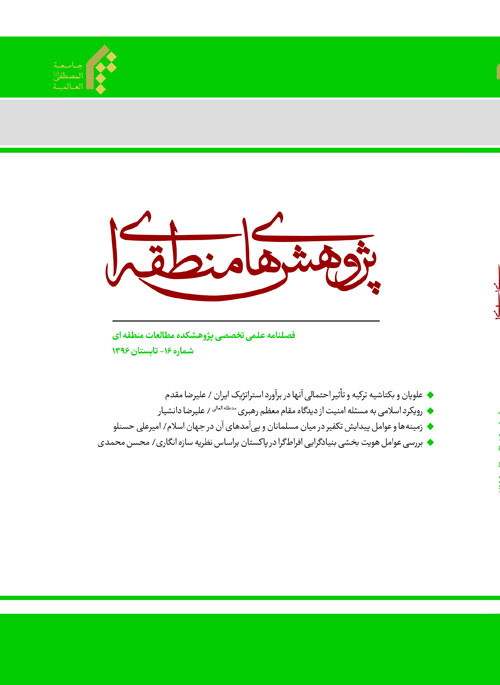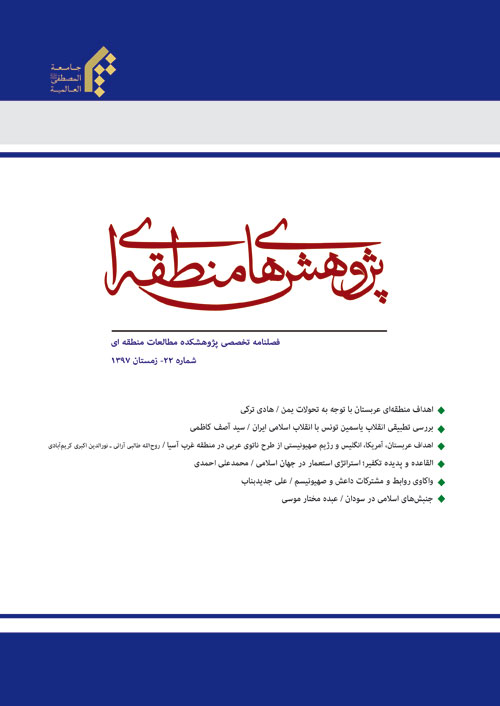فهرست مطالب

فصلنامه پژوهش های منطقه ای
سال پنجم شماره 16 (تابستان 1396)
- تاریخ انتشار: 1397/10/10
- تعداد عناوین: 4
-
صفحه 7علویان، عنوانی است که برای همه ی علویان و بکتاشیان در ترکیه به کار میرود. علویان با وجود برخی اختلافات عقیدتی با شیعیان، در برههای از تاریخ، با توجه به تقابل عثمانی ها با ایشان، به حکومت صفویه در ایران نزدیک شدند. اگر چه با تحکیم تشیع فقاهتی در ایران، از سویی و دوری علویان از فقه و شریعت، از سوی دیگر، علویان، به تدریج، از حکومت ایران فاصله گرفتند، ولی با شکل گیری انقلاب اسلامی ایران و با نگاهی به ژئوپلتیک تشیع و وجود برخی اشتراکات علویان ترکیه و شیعه ی امامیه، این پرسش مطرح میشود که در برآورد استراتژیک جمهوری اسلامی ایران، علویان ترکیه چه جایگاهی میتوانند داشته باشند و فرصتها و تهدیدات آنها برای جمهوری اسلامی چیست؟ در پاسخ به این پرسش، نویسنده ی این مقاله استدلال می کند که با وجود برخی شباهتها بین علویان و شیعه ی امامیه و در نتیجه، ایجاد برخی فرصتهای نزدیکی و همکاری علویان و شیعه ی امامیه و همچنین جمهوری اسلامی ایران، محدودیتها و موانع نزدیکی بین علویان و شیعه ی امامیه، بیش از ظرفیتها و زمینههای همکاری است و در نتیجه، امکان نزدیکی استراتژیک این دو بعید به نظر میرسد. این مقاله می کوشد با استفاده از منابع کتابخانهای موجود در خصوص اعتقادات و جایگاه علویان ترکیه، به توصیف و تحلیل زمینهها، فرصتها و موانع همکاری علویان و شیعه ی امامیه بپردازد.
کلیدواژگان: ایران، برآورد استراتژیک، بکتاشیه، ترکیه، علویان -
صفحه 23پرسش اصلی پژوهش حاضر عبارت است از: رویکرد اسلامی به مسئله امنیت در جهان معاصر با تاکید بر دیدگاه های مقام معظم رهبری (حضرت آیت الله العظمی خامنه ای(مدظله العالی) ) چیست؟ روش این پژوهش، از منظری توصیفی- تحلیلی، به بررسی و تحلیل محتوای دیدگاه ها و نظرات مقام معظم رهبری (مدظله العالی) درباره ی امنیت پرداخته است. در این رویکرد، امنیت از نظر امری انسانی، از انسان و درون او نشئت گرفته و دارای بعدی معنوی است و دیگر وجوه مادی امنیت و آرامش از آن سرچشمه می گیرد. رویکردهای امنیتی در دنیای معاصر، از وجوه معنوی و اخلاقی امنیت غفلت نموده اند. عامل اصلی ایجاد ناامنی، خودخواهی و سرکشی، انسان است که موجودیت انسان ها و در نتیجه، مسئولیت اخلاقی آنان را تحت تاثیر قرار داده و موجب جنگ و تجاوز شده و امنیت و آرامش را از بین برده است. در رویکرد آیت الله العظمی خامنه ای (مدظله العالی) ، بازگشت به مسیر فطرت (پذیرفتن رسالت دین در اجتماع و سیاست) ، روی آوری به ایمان و معنویت دینی، شناسایی اسلام حقیقی و تمایز آن با اسلام های ادعایی مانند داعش، آگاهی از سیاست های منطقه ای و متضاد غربی، ارتباط، گفت وگو و احترام به فرهنگ های دیگر و…، از راهکارهای اعتقادی، فرهنگی و سیاسی برای رسیدن به امنیت و آرامش در جهان معاصر است
کلیدواژگان: رویکرد اسلامی، امنیت، مقام معظم رهبری (مدظله العالی)، معنویت، جهان معاصر -
صفحه 47بی گمان، پدیده ی تکفیر، ریشه در بنیان های فکری جاهلیت دارد. این تفکر پس از رسوخ در تفکر مسلمانان و منابع دینی فقهی و کلامی، طرفدارانی یافت و به صورت نظریه و نگرش درآمد. شکل گیری آن بیشتر معلول گرایش های سیاسی حول محور خلافت پس از پیامبر (ص) بوده است. عوامل دیگری مانند گرایش های حدیثی صرف و دوری از دخالت دادن عقل و خردگرایی و دوری از محوریت علمی اهل بیت (علیهم السلام) و رفتارهای تکفیری امویان در جوانه زدن این اندیشه در اسلام موثر بوده است. در قرن چهارم، فرقه های گوناگون شیعی در افریقا مورد تکفیر واقع شده، به قتل رسیدند؛ تکفیر متقابل فرق اهل سنت، به ویژه در شافعیان با حنفیان، تا قرن هفتم با تکفیر همراه بود. افکار «ابن تیمیه» و طرفدارانش، فصلی جدید از تکفیر در مسلمانان به وجود آورد که دامنه ی آن، پی آمدهای خون باری برای مناطق اسلام داشته است. پیوند اندیشه ی تکفیر با پدیده ی استعمار، فصل پیچیده تر و پی آمد تخریب گسترده در جهان اسلام در پی داشته است. این مقاله، ضمن جریان شناسی تاریخی پدیده ی تکفیر، به پی آمدهای ناگوار آن با هدف روشنگری و چاره جویی می پردازد.
کلیدواژگان: جهان اسلام، اهل بیت (علیهم السلام)، تکفیر، خاورمیانه -
صفحه 77افراط گرایی نوعی بنیادگرایی خشن است که از مهم ترین مسائل جریان شناسی دینی پاکستان شده و ابعاد امنیتی در سطح ملی، منطقه ای و بین المللی پیدا کرده است. این موضوع با رویکردهای گوناگون معرفتی- ایدئولوژیک یا سیاسی- اجتماعی بررسی گردیده است. در این مقاله، با توجه همزمان به این دو رویکرد، عواملی بررسی می گردد که سبب می شود گروه های اسلامی در پاکستان هویتی از جنس بنیادگرایی افراط گرا پیدا کنند. چارچوب نظری در این بررسی، نظریه ی سازه انگاری است که به عوامل هویتی با رویکرد اجتماعی توجه ویژه دارد. عوامل موثر بر هویت از نگاه سازه انگاران عبارت است از: فرهنگ و ارزش ها، هنجارها و قواعد رفتاری، عقاید و باورها، کنش متقابل بین الاذهانی (نمادین). در تحلیل بنیادگرایی در پاکستان، هر یک از این عوامل دخیل اند. فرهنگ قبیله ای، از مهم ترین عناصر فرهنگی پاکستان در زمینه ی بنیادگرایی افراطی به شمار می رود. ایدئولوژی گذشته گرا و تاسیس خلافت، از مهم ترین افکار و ایدئولوژی بنیادگرایان افراط گرا در پاکستان است. ضعف ظرفیت سازشی، خشونت گرایی، ضعف فرهنگ گفت وگو و نبود تساهل در تعامل با دیگران، در بنیادگرایان افراطی در پاکستان وجود دارد. در پایان نیز در بررسی کنش متقابل نمادین براساس رابطه ی کنشگر- ساختار، به تعامل نیروهای بنیادگرا با ارتش، دولت و همچنین قدرت های خارجی پرداخته می شود. این تعامل در قالب امنیت سخت افزارانه و نرم افزارانه تحلیل می گردد.
کلیدواژگان: هویت، بنیادگرایی، افراط گرایی، ایدئولوژی، امنیت، خشونت، قبیله گرایی
-
Page 7The Alawites is the title used for all Alawites and Bektashis in Turkey. Despite some ideological differences with the Shiites, at a time of history, the Alawites approached to the Safavid rule in Iran, given the opposition of the Ottomans to them. Although with the consolidation of the faithful Shi'ism in Iran, on a hand, and the Alevis avoiding from the jurisprudence and the law, on the other hand, the Alevis gradually separated from the Iranian government, but with the formation of the Islamic Revolution of Iran and with a view to the geopolitics of Shiism and the existence of some commons The Alawites of Turkey and Shiite Imams, the question arises that what is the position of the Alawites in Turkey in the strategic assessment of the Islamic Republic of Iran, and what are their opportunities and threats to the Islamic Republic? In answering this question, the author of this article argues that despite some similarities between the Alawites and the Shiite Imams, and as a result, creating some opportunities for vicinity and collaboration of the Alawites and the Shiite Imams, as well as the Islamic Republic of Iran, the restrictions and barriers The proximity of the Alawites and Shiite Imams is more than the capacities and the fields of cooperation, and as a result, the possibility of the strategic closeness seems unlikely. This article tries to describe and analyze the fields, opportunities and barriers of cooperation between the Alawites and the Shiite Imams using the available library resources on the beliefs and position of the Alevis of Turkey.Keywords: Iran, Strategic Estimation, Bektashiyah, Turkey, Alawites
-
Page 23The main question of the present research is: What is the Islamic approach to the issue of security in the contemporary world, with emphasis on the views of the Supreme Leader (Supreme Leader Ayatollah Khamenei)? The method of this research, from a descriptive-analytical perspective, has been to review and analyze the content of the views and opinions of the Supreme Leader (Supreme Leader) about security. In this approach, the security in terms of humanity, originate from human being and within him, and has a spiritual aspect, and other material aspects of security and peace originate from it. Security approaches in the contemporary world have neglected the spiritual and moral aspects of security. The main cause of insecurity, selfishness, and rebellion is the human being which has affected exerting human beings and consequently, their moral responsibility, and has caused war and aggression and eliminated security and calm. In ayatollah Khamenei's approach, returning to the path of nature (acceptance of the mission of religion in society and politics), converting to religious faith and spirituality, identifying true Islam and distinguishing it from alleged Islam, such as ISIS, knowledge of western regional and contradictory policies, communication, dialogue and respect for other cultures, etc., are religious, cultural and political solutions for achieving security and peace in the contemporary world.Keywords: Islamic approach, security, Supreme Leader, Spirituality, Contemporary World
-
Page 47Certainly, the phenomenon of takfir is rooted in the intellectual foundations of ignorance. This thought fans found after an influx in Muslims thinking and religious sources of jurisprudence and theology, and became a theory and attitude. Its formation was more affected by the political tendencies around the caliphate after the Prophet (PBUH). Other factors, such as hadith mere tendencies, and avoid interference with reason and rationalism, away from the scientific focus of Ahl al-Bayt (PBUH) and the Takfiri behaviors of the Umayyads have been effective in fostering this thought in Islam. In the fourth century, various Shiite sects were excommunicated and murdered in Africa; the mutual Takfir of the Sunni sects, especially the Shafees with Hanafi, was with Takfir until the seventh century. Abantimyah's thoughts and his fans created a new era of Takfir in Muslims, whose its domain has led to bloody consequences for the Muslim regions. The connection of Takfir
thinking with the phenomenon of colonialism has led to a more complicated chapter and the consequence of widespread destruction in the Muslim world. This article, along with the historical flow of Takfir phenomenon, addresses its adverse consequences with the goal of enlightenment and resolution.Keywords: Islamic world, Ahl al-Bayt (against Islam), Takfir, Middle East -
Investigating the giving identity of extremist fundamentalism in Pakistan based on structural theoryPage 77Extremism is a kind of violent fundamentalism, which has become one of the most important issues in Pakistani religious studies and has found security dimensions at national, regional and international levels. This issue has been examined with various epistemological-ideological or socio-political approaches. In this article, with simultaneous attention to these two approaches, factors are being investigated witch cause Islamic groups in Pakistan to find an extremist fundamentalist identity. The theoretical framework in this study is a constructivist theory that has particular attention to identity factors with a social approach. The factors influencing identity from the viewpoint of the constructivists are: culture and values, norms and rules of behavior, opinions and beliefs, interactive interaction of symbols (symbolic). In fundamentalist analysis in Pakistan, each of these factors is involved. Tribal culture is one of the most important cultural elements of Pakistan in terms of extremist fundamentalism. The past ideology and the establishment of the caliphate is one of the most important thoughts and ideologies of extremist fundamentalists in Pakistan. The weakness of reconciliation capacity, violence, lack of dialogue culture and lack of tolerance in engaging with others exist in extremist fundamentalists in Pakistan. In the end, in the examination of the symbolic interaction, based on the structure-activist relationship, the interaction of fundamentalist forces with the military, the state, and foreign powers is also addressed. This interaction is analyzed in the form of hardware and software security.Keywords: Identity, Fundamentalism, Extremism, Ideology, Security, Violence, Tribalism


